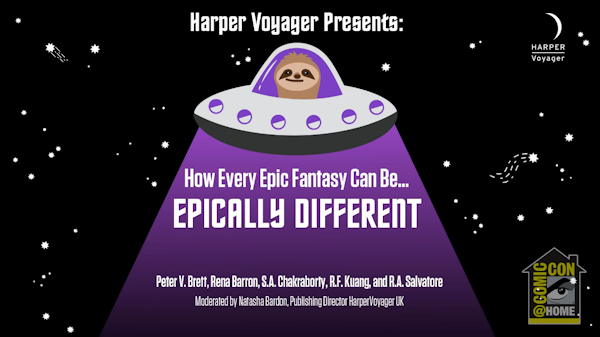
In a move that probably shocks no one, I went to yet another virtual convention—this time Comic-Con@Home back in July. But this time instead of waxing poetic about how awesome this shift to virtual is or exclaiming how this could be a once-in-a-lifetime opportunity for some like I did before, this time I wanted to share some pearls of wisdom from fellow fantasy authors.
In the panel called “How Epic Fantasy can be Epically Different”, five fantasy authors talk shop about how to make the worlds of dragons and magic unique. Moderated by Natasha Bardon, this panel featured the following authors: Peter V. Brett (Barren), Rena Barron (Kingdom of Souls), S.A. Chakraborty (The Empire of Gold), R. F. Kuang (The Dragon Republic), and R. A. Salvatore (Relentless). The great thing is, you can still watch it on YouTube (!!!) so for this article I’ll pull my favorite ideas and let you watch the rest. You’ll note lots of ideas from Rebecca Kuang; her words resonated with me the most.

When asked “what, to you, makes epic fantasy epic: stories of the individual who are part of the epic tale…” Brett answered how usually fantasy deals with huge problems that are wide in scope and affects a lot of people, but how it filters down in different ways for different people and how those different ways of solving the problems make for an interesting story. Kuang echoed that idea, talking passionately about how sometimes we think of history (a huge inspiration for her) with a major emphasis on huge, large-sale events…but doing so leaves out the smaller-scale yet still super important records. The lost tales, or the ones done by individual people who might not do huge epic things but are just trying to survive. I really love this idea because when you boil down fantasy stories—and really any stories—it’s all about the characters. The high stakes are cool when a dragon is spitting fire at a city, but if the readers don’t know anyone in that city, they’re less likely to care. It’s all about the characters.
When asked, “What elements do you take in the real world/real history…” Kuang’s answer was my absolute favorite. She talked about how motivations and reasons for conflict are easier to draw out of history instead of out of your own head and mentioned how she doesn’t like bland acts of power or acts of war. When the only real motivation is, they want to “kill all mages” or conquer this specific area, it doesn’t create any foundation for wondering about the motivations or understanding the “other.” I found this fascinating and completely true! It’s more interesting if you can showcase the gray area of the characters because everyone has a reason—a real deep-seated reason—for doing the things they’re doing. Exploring those reasons will make your characters feel more human.
When asked, “What happens when a character becomes too powerful and how can you deal with that…” the panelists talked about how there’s the cardinal rules for writing: things can be never too easy for the protagonist and how the villains have to level up/learn from their mistakes…meaning the villain must never fall for the same trick twice. Chakraborty had some interesting ideas, namely how she wanted to look at systems of power (both magic and not) and how the people her readers meet aren’t the most powerful magically but they are just as politically savvy and cunning. Quite a few of the authors on the panel echoed her thoughts. This was a lovely idea to think about, since when I think of fantasy, I do think of unique magic systems and the rules surrounding it. But when you have an intense magic system seen through the eyes of a character who might not be the most magically gifted, it makes sense that those none-magically gifted characters would use other means to get ahead. And I love that idea!
I could gush about this for ages more! It was such a great panel. Fantasy writers and fellow creatives, take a few moments and listen to this panel if you can. If not (or if the panel is taken down months or years from now), take the words I highlighted to heart because all these authors are doing great things in world of fantasy.

